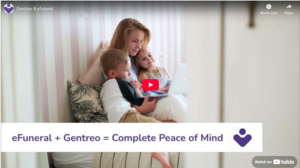
Estate planning is a critical step to ensuring your loved ones are cared for and your assets distributed according to your wishes. A key part of estate planning is creating a will, a legal document that outlines how your assets should be handled after your passing. But what happens if you don’t have a will? Unfortunately, without a will, you leave important decisions about your estate, your family, and even your legacy to state laws and court systems. This can lead to outcomes you might not expect or want.
Let’s explore the potential consequences of dying without a will, the legal process that follows, and why it’s so important to take control of your estate planning with tools like Gentreo.
Intestate Succession: The Default Rules
When someone dies without a will, they are said to have died “intestate.” In this case, the distribution of their assets is governed by intestate succession laws, which vary from state to state in the United States. These laws determine who inherits your property, and they typically prioritize your closest living relatives, such as your spouse, children, or parents.
While intestate succession provides a framework, it does not account for individual preferences or unique family dynamics. For example:
- Spousal Inheritance: In some states, your spouse may inherit all your assets. In others, they might share your estate with your children or other relatives.
- Children’s Shares: If you have children, the law may divide your estate equally among them, regardless of their financial needs or relationships with you.
- Unmarried Partners: If you have a long-term partner but are not legally married, they typically will not inherit anything under intestate laws.
- Estranged Relatives: Intestate succession doesn’t consider estranged family relationships. An estranged sibling or parent could inherit part of your estate, even if you’ve had no contact for years.
Without a will, you lose the ability to decide who gets what, potentially leaving loved ones unprotected and sparking conflicts among heirs.
The Probate Process Without a Will
Probate is the legal process of administering a deceased person’s estate, and it’s required whether or not a will exists. However, without a will, probate becomes more complicated and time-consuming.
- Appointment of an Administrator: Instead of naming an executor in a will, the court appoints an administrator to oversee your estate. This person might not be someone you would have chosen.
- Asset Identification and Valuation: The administrator must identify and value all your assets, which can be a challenging task if records are incomplete or scattered.
- Debt Settlement: Outstanding debts and taxes must be paid from your estate. Without a will, creditors may have more leverage to claim a share of your assets.
- Distribution of Assets: The remaining assets are distributed according to intestate succession laws. This process can be delayed significantly if disputes arise among potential heirs.
Unintended Consequences of Not Having a Will
Without a will, your estate’s fate might diverge significantly from your intentions. Here are some common unintended consequences:
- Family Disputes: Intestate estates often lead to disagreements among family members over who should inherit what. These disputes can strain relationships and deplete the estate’s value through legal fees.
- Children’s Guardianship: If you have minor children, the court will decide who becomes their guardian. This decision may not align with your wishes or the children’s best interests.
- Loss of Charitable Giving: If you hoped to leave part of your estate to a favorite charity, that wish will not be honored without a will specifying it.
- Higher Costs: The probate process for intestate estates can be more expensive and time-consuming than for those with a will, reducing the value of the estate available to heirs.
- Pets Without Care Plans: If you have pets, their care could be uncertain. Courts do not typically address pet care unless a specific provision exists in a will or trust.
The Emotional Toll on Loved Ones
Beyond the financial and legal implications, dying without a will places an emotional burden on your loved ones. During a time of grief, they must navigate complex legal processes, make difficult decisions, and possibly deal with family conflicts. Having a will in place can provide clarity, reduce stress, and allow your family to focus on healing.
Special Considerations for Blended Families
Blended families face unique challenges when it comes to estate planning. Without a will, the default rules of intestate succession may not account for stepchildren or other non-biological family members you wish to include.
For example:
- Stepchildren typically have no inheritance rights unless formally adopted.
- A surviving spouse might inherit everything, leaving children from a previous relationship with nothing.
Creating a will ensures that all members of your blended family are included in your estate plan according to your wishes.
How Gentreo Simplifies the Estate Planning Process
Creating a will doesn’t have to be intimidating or expensive. Gentreo provides an accessible and affordable solution for individuals and families looking to protect their futures. With Gentreo, you can:
- Create a legally valid will tailored to your state’s laws.
- Create new documents and update your documents as your life circumstances change.
- Securely store and share your will and other important documents using the Gentreo Digital Vault.
- Access additional estate planning tools, such as powers of attorney, healthcare proxies, and pet trusts.
Gentreo makes it easy to take control of your estate planning and avoid the complications of dying intestate.
Steps to Avoid Dying Without a Will
To protect your loved ones and ensure your wishes are honored, take the following steps:
- Start Now: Don’t wait for a major life event to prompt you into action. Begin your estate planning today.
- Use Trusted Tools: Choose a reliable platform like Gentreo to create and manage your will.
- Keep It Updated: Regularly review and update your will to reflect changes in your family, assets, or preferences.
- Communicate Your Wishes: Let your loved ones know your estate plan exists and where they can find it.
- Plan for the Unexpected: Include provisions for minor children, pets, and charitable giving to address all aspects of your legacy.
The Peace of Mind a Will Provides
Having a will is more than just a legal requirement—it’s a gift to your loved ones. It provides peace of mind, knowing that your wishes will be respected and that your family won’t face unnecessary stress or conflict. It also allows you to leave a meaningful legacy, ensuring that your values and priorities are reflected in how your estate is handled.
Why Estate Planning Is an Ongoing Process
Life is full of changes, and your estate plan should evolve with you. Whether it’s getting married, having children, starting a business, or retiring, each life event is an opportunity to revisit and update your estate plan. Gentreo’s platform makes it easy to keep your plan current, so you’re always prepared for the unexpected.
So, What does this all mean?
Dying without a will leaves your estate’s future in the hands of state laws and courts, often resulting in unintended and costly outcomes. By creating a will, you regain control, protect your loved ones, and provide a clear roadmap for your legacy. Learn more here about creating a will with Gentreo, https://www.gentreo.com/wills.
Gentreo’s estate planning tools are designed to make this process simple, affordable, and accessible for everyone. Don’t leave your family’s future to chance—start planning today with Gentreo and ensure that your wishes are honored and your loved ones are cared for.
Don’t wait until it’s too late; start your estate planning journey with Gentreo today. By doing so, you’ll not only protect your loved ones but also gain the peace of mind that comes with knowing your legacy is secure. Click HERE to join now.
This article is for informational purposes only and should not be considered legal advice. Consult with a qualified attorney or estate planning professional for personalized guidance.













